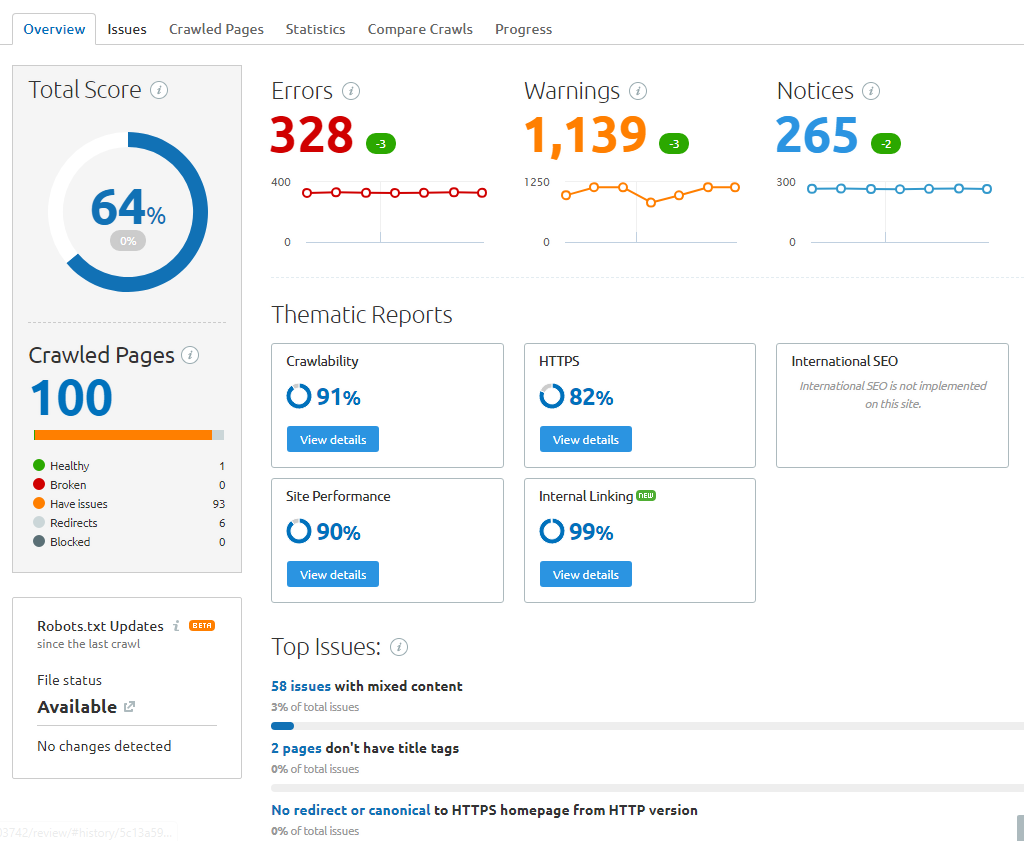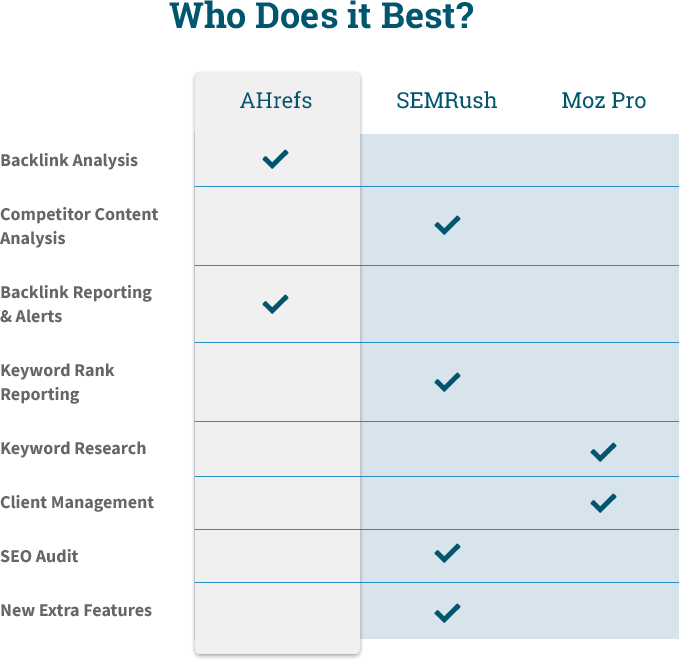
Ahrefs vs SEMrush vs Moz: An Honest Review of Top SEO Tools
Three SEO tools dominate the market—and for a good reason. And I’ll be reviewing these titans of the industry today in this article on Ahrefs vs SEMRush vs Moz Pro. And they should be the only ones talked about because they provide almost everything you’d want to help increase organic traffic and track results.
I had the opportunity to try out Ahrefs for a few weeks. This honest Ahrefs review describes the most notable features, benefits, and drawbacks of Ahrefs and gives a comparison to SEMRush, our agency’s current tool of choice. After having used SEMRush and Moz Pro each for over a year, we certainly have some experience to go off of. Let’s start with noteworthy features.
A rundown of the best Ahrefs features
Ahrefs’s backlink reporting
Simply put, Ahrefs has good backlink reporting. In fact, Ahrefs seems to be the best at backlink analysis and highlights its tools in this area prominently in its user interface.
Any link that you input in the tool generates a robust report with all the metrics and filters you’d hope to find with any standard backlink analysis, including follow vs. nofollow filters, domain extension filters (.edu, .org, etc.), page authority, and domain authority.
Ahrefs’s Link Intersect feature
From the dropdown navigation, you can find a Link Intersect feature. This tool shows pages that are linking out to specific pages (like those of competitors) but not to a specified URL (you can put your domain here). This feature is excellent for link prospecting—you can find the websites that are most willing to link to you based on their history of linking to related content.
SEMrush has this feature too, but our agency has found blatant inaccuracies with its reporting. We discovered that we own links from certain sites even though SEMrush says we don’t.
Ahrefs’s Content Gap feature
The Content Gap feature is available under the Site Explorer option in the left navigation menu. Unlike Link Intersect, this tool shows you if there are any keywords that most of your specified URLs rank for but that one URL doesn’t rank for. This feature is great for competitor analysis. With it, you can determine what keywords in your industry you should be targeting but aren’t yet.
The tools SEMrush and SpyFu also offer this feature with a visual Venn diagram. Ahref’s version seems to provide more accurate, thorough data. SpyFu excels more on the PPC side rather than the organic side of digital marketing.
Ahrefs’s backlink email alerts
You can get email alerts for backlinks won or lost, keywords you’ve just obtained rankings for, or brand mentions by language, in title, or in content. I don’t believe SEMrush offers this feature to this level of detail. Email alerts are a fantastic way to stay on top of any recent achievements (or lack thereof), so you can report them to your boss and see what’s working to change your strategy.
Ahrefs’s Screaming Frog integration
The final feature worth mentioning is an integration with Screaming Frog. Ahrefs offers many integrations, but this one is the most notable since industry experts still suggest and use this SEO audit tool often. After it’s set up, Frog can pull data that it doesn’t have directly from Ahrefs to build more thorough SEO reports than it usually delivers.
Are you interested in learning more about SEO Strategy? Grab a FREE e-book on optimizing the prospect journey here.
Ahrefs vs. Moz Pro
Here’s how Ahrefs stacked up against Moz.
Ahrefs’s rank tracker feature, under Site Explorer in the left navigation menu, isn’t anything to write home about. That’s because the user interface and keyword rank tracking accuracy aren’t spectacular. Moz Pro could also use some improvement with its keyword tracking tool. It often only tracks ranking history for an arbitrary number of weeks back in time, even if you added the keyword earlier than that time point it returned. Our agency would need to use Ahrefs for at least a couple of months before we could give a conclusion on where it stacks, but it seems like it’s slightly better than Moz in this regard.
On the other hand, Moz’s keyword research tool seems to give more keywords than Ahrefs’s version. It offers unique filters based on intent and length, but I still didn’t get as many relevant keywords as I wanted.
Side note: There’s now a free tool that’s just as good as (if not better than) the giants: Neil Patel’s UberSuggest. Sometimes, I use UberSuggest first over other tools because it gives a more thorough list of keywords and their respective difficulty scores, all in one place. UberSuggest doesn’t find every keyword I’m after, but it helps me identify more keywords than other tools will.
Moz’s backlink data analysis is one of the first of its kind and still well respected. I trust their domain authority and page authority scores more than those produced by other tools. As far as the backlink reports go, I’d choose Ahrefs; it seems to have higher accuracy when it comes to telling me what URLs link to a page.
When it comes to client management dashboards, Moz may have the best out of all of them. Moz clearly built the tool for agency use. You can easily switch between dashboards for different client domains and intuitively identify all the features you can use. There aren’t as many gadgets, but the interface is easy to understand. Ahrefs, on the other hand, seems to be better suited for personal use.
Moz’s SEO audit features are better than Ahrefs’. Moz has many more years of experience and trial and error under its belt to build a more actionable audit tool, so this is understandable. But if I had to choose one from among the three SEO audit tools, SEMrush would win. You’ll see why soon enough.
Ahrefs vs. SEMrush
When you put Ahrefs head to head with SEMRush, one thing is clear: SEMRush has more keyword accuracy. Ahrefs isn’t bad at providing keyword data—it’s just not as complete and precise as SEMRush. SEMRush gives the exact keywords that any page you enter ranks for, including their positions and rankings. Ahrefs is more likely to fail to report keywords that a URL ranks for than SEMRush is.
Ahrefs’s keyword rank tracker isn’t as accurate as SEMrush’s version. For example, Ahrefs claims that webmechanix.com/marketing/social-media ranks for nothing, but SEMrush accurately claims that it ranks for 36 keywords, one of which is in the top ten results.
Ahrefs’s keyword research tool is useful. But that’s also because the competition in this area is nothing special. Sometimes, SEMRush’s research tool acts like it’s still in beta since it spits out an underwhelming number of keywords. I’d choose Moz Pro out of all three here.
Ahrefs also has its version of a Keyword Difficulty metric on a 0-to-100 scale. As with SEMrush, their Difficulty data isn’t complete for many keywords—in fact, you often won’t get a Difficulty number back at all. Unfortunately, this database problem is aggravating, since you get no reference point for how easy or difficult it is to rank for these keywords and must use other tedious methods to fill in those gaps. Plus, it’s hard to synthesize the difficulty metrics from one test run of a tool with those of another. Although each tool uses a 0-to-100 scale, one tool may have a 20-to-30-point average difference in how it scores keywords.
As far as backlink data accuracy, I’d give the vote to Ahrefs. Our agency has come across inaccuracies with SEMRush’s backlink reports. For example, when you submit the URL clutch.co/agencies/social-media-marketing/facebook, Ahrefs picks up more backlinks for the URL than SEMRush does. Specifically, SEMrush returns 0 while Ahrefs returns 23.
We’ve also observed inaccuracies with SEMRush’s backlinks won and lost report and SEMRush’s Link Intersect tool. That said, Ahrefs isn’t perfect either, claiming that webmechanix.com lost a link from https://impact.marketstar.com/blog/b2b-sales-techniques-for-a-digital-world, but it’s still there. As far as backlink filtering capabilities, both tools do a great job. If I had to choose a software for backlink analysis, I’d swoop up Ahrefs.
Another point goes to Ahrefs for having no one-user limit. SEMrush is the only tool that forces you to log in one person at a time, which is terrible for agency use. With a dozen employees vying for the tool, WebMechanix has to have employees book time on a calendar to use the tool so that one person can use SEMrush without getting kicked out. As we grow, we’re more likely to lose productivity (unless we shell out the money to buy more copies) because SEOs have to wait their turn to use the tool. SEMRush can probably remove the one-user limit with a flip of a switch, but they probably keep it to earn more money.
All three SEO tools offer a dashboard that lets you monitor stats for multiple domains, which is fantastic for agencies managing dozens of clients. But SEMRush’s one-user limit restricts an agency from using the monitoring capabilities to full effect. The restriction seems short-sighted, and they may lose out in the long term despite making more money in the near future.
When it comes to SEO audit features, a point goes to SEMrush over Ahrefs. Ahrefs has a hard time competing with SEMRush’s intuitive and comprehensive audit results. As you can see in the screenshot below, SEMrush’s audit delivers a color-coded, high-level dashboard of improvements you can make along with an overall score. By clicking any of the areas, you can get a more detailed report of what you need to fix.

Conclusion: A Final Breakdown of Ahrefs vs SEMrush vs Moz Pro

This Ahrefs review went over the benefits and drawbacks of Ahrefs based on my experience trying it out. The tool shines when it comes to anything related to backlink data analysis. It’s certainly a contender in the keyword analysis department with its Keyword Intersect tool, but SEMRush still takes the cake in that area. Some Ahrefs features fell short of what our tools already do, which is understandable since there’s fierce competition.
All the prominent SEO tools excel in one area. But they have room for improvement on the accuracy and comprehensiveness of reporting and the intuitiveness of their user interfaces. Each solution is impressive in its own way, but the digital marketing tool landscape is occupied by many companies that force a user to purchase multiple items to accomplish their goals—and assemble them in a Frankenstein way that doesn’t lead to the highest productivity.
Some tools are trying to become the Swiss Army knife of SEO by trying to offer every feature you can think of. They’re doing well but not extraordinarily in this endeavor. They could do better by improving the accuracy and thoroughness of the data and features we already use daily (keyword and backlink analysis) rather than trying to add fancy features we rarely use (e.g., a social media tracker).
The vast number of different features that a tool offers, coupled with a convoluted user interface, can overwhelm, intimidate, or confuse users. SEMrush has dozens of links you can click in the navigation menu of the tool, which is the opposite of the intuitive, simple interface we want—a big part of google.com’s homepage and success.
If an SEO tool can emerge that solves these issues and keeps the customers’ desires as the number-one priority (e.g., by not having a one-user limit), that tool can overtake the competition and become the dominant go-to tool in the market, making it a win-win for that business and the users.
Ahrefs is a useful tool that’s worth your time. But I can’t say that it’s a tool that’s the best in all areas.
What are you looking for in an SEO tool, and which tool do you think best fulfills that desire?
Speaking of SEO, a large part of mastering that skill is understanding the customer journey. Grab a FREE e-book on optimizing the prospect journey here.
Most newsletters suck...
So while we technically have to call this a daily newsletter so people know what it is, it's anything but.
You won't find any 'industry standards' or 'guru best practices' here - only the real stuff that actually moves the needle.






